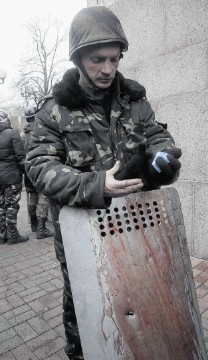
The Ukrainian government’s signing in November of a production sharing agreement with Chevron to explore and develop shale gas in the Lviv region was widely greeted as a landmark deal for the future of the former Soviet Satellite’s energy security.
Under the deal, Chevron will initially invest $50million in exploration for shale gas at the Olesska field, with potential future investment put at up to $10billion.
The government has been trying to find alternative sources of energy to reduce its dependence on Russian natural gas supplies and had signed a similar deal earlier in the year with Shell. OMV of Austria is another European company with significant exploration stakes in the country.
The development of energy reserves, including the exploration of unconventional sources, has in the past been hampered by issues including an off-putting investment environment and regulatory uncertainty.
The development of the country’s own domestic resources will be key for breaking its dependence on Russian energy imports, with President Yanukovych asserting that such agreements would allow the country to become self-sufficient in gas by 2020, even suggesting that Ukraine could eventually become an exporter of gas.
Despite this high-level push to attract foreign expertise and capital to explore the country’s natural hydrocarbon resources, the current political unrest in Kiev has highlighted some of the myriad of problems which persist for foreign investors operating in Ukraine.
After weeks of peaceful political protests in the wake of President Yanukovych’s U-turn on trade relations with the EU, confrontations have escalated resulting in the deaths of scores of anti-government protesters and policemen.
Violence between the police and anti-government protesters, mainly centred around Independence Square (“Maidan”) escalated as the authorities sought to dismantle opposition camps in the area.
At the time of writing, police were using tear gas, stun grenades and water cannon in the clashes, and protesters were replying with Molotov cocktails, improvised missiles and fireworks.
Access to and around Kiev was blocked, main road arteries and the metro system were closed, and cross-country trains cancelled.
Protests have also spread to other cities in the country. In Lviv, a city in western Ukraine long associated with Ukrainian nationalism, a regional police office was destroyed and several government buildings were reported to have been taken over by opposition protesters. Despite the presence of some extremist elements among the protest movements, the opposition rallies do have a wide support base, particularly in the west of the country.
The current unrest and the growing likelihood of sanctions being introduced against government and security figures may well serve to further deter foreign energy companies from operating in Ukraine, particularly if political uncertainty grows and violence spreads.
Sanctions would be likely to target individuals including former Prime Minister Mykola Azarov and Oleksandr Yanukovych, son of the incumbent president and who is believed to have significant personal and business interests in Western Europe.
The deadly violence in Kiev has illustrated that despite the government’s eagerness to attract foreign energy companies, the country still faces a number of significant hurdles before it can reassure investors of the stability of its investment environment.
Louise Taggart is head of intelligence at AKE Group